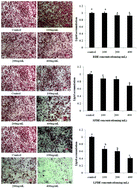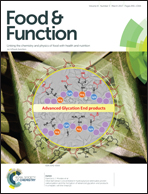The anti-obesity effect of fermented barley extracts with Lactobacillus plantarum dy-1 and Saccharomyces cerevisiae in diet-induced obese rats
Abstract
Fermented cereals have significant potential for improving the nutritional quality and health effects of foods and ingredients. In the present study, aqueous extracts of fermented barley with either Lactobacillus plantarum dy-1 or Saccharomyces cerevisiae were investigated for their anti-adipogenic effects in vitro and in vivo. Oral administration of an aqueous extract of fermented barley with Lactobacillus plantarum dy-1 (LFBE) significantly prevented body weight gain and fat mass increase, and improved lipid profiles and glucose tolerance in high fat diet-induced obese male rats. In contrast, an aqueous extract of fermented barley with Saccharomyces cerevisiae (SFBE) had no significant anti-obesity effects. In addition, LFBE effectively inhibited adipocyte differentiation in a dose-dependent manner, but only a high dose of SFBE had similar effects. Phenolic acids (mainly vanillic acid and ferulic acid) and β-glucan in LFBE were responsible for the lipid accumulating actions and may be considered as primary anti-obesity mediators. The results showed that LFBE has more significant anti-obesity effects than SFBE. LFBE has the potential to prevent obesity and its related metabolic diseases.



 Please wait while we load your content...
Please wait while we load your content...